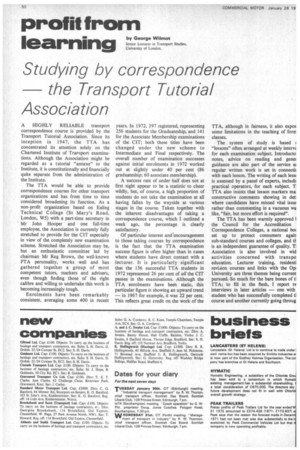profit from learning
Page 52

If you've noticed an error in this article please click here to report it so we can fix it.
by George Wilmot
Senior Lecturer in Transport Studies, University of London.
Studying by correspondence the Transport Tutorial Association
A HIGHLY RELIABLE transport correspondence course is provided by the Transport Tutorial Association. Since its inception in 1947, the TTA has concentrated its attention solely on the Chartered Institute of Transport examinations. Although the Association might be regarded as a tutorial "annexe" to the Institute, it is constitutionally and financially quite separate from the administration of the Institute.
The TTA would be able to provide correspondence courses for other transport organizations and has from time to time considered broadening its function. As a non-profit organization based on Ealing Technical College (St Mary's Road, London, W5) with a part-time secretary in Mr John Hooper and one full-time employee, the Association is currently fully stretched to provide for the CIT especially in view of the completely new examination scheme. Stretched the Association may be, but an enthusiastic committee led by chairman Mr Reg Brown, the well-known FTA personality, works well and has gathered together a group of most competent tutors, markers and advisers, even though finding those of the right calibre and willing to undertake this work is becoming increasingly tough.
Enrolments have been remarkably consistent, averaging some 400 in recent years. In 1972, 397 registered, representing 256 students for the Graduateship, and 141 for the Associate Membership examinations of the CIT; both these titles have been changed under the new scheme to Intermediate and Final respectively. The overall number of examination successes against initial enrolments in 1972 worked out at slightly under 40 per cent (86 graduateship; 60 associate membership).
A success rate of under half does not at first sight appear to be a statistic to cheer wildly, but, of course, a high proportion of students do not take the examination at all having fallen by the wayside at various stages in the course. Taken together with the inherent disadvantages of taking a correspondence course, which I outlined a week ago, the percentage is clearly satisfactory.
Of particular interest and encouragement to those taking courses by correspondence is the fact that the TTA examination success figure is often higher than in cases where students have direct contact with a lecturer. It is particurarly significant that the 136 successful TTA students in 1972 represented 26 per cent of all the CIT passes in the examinations. Although the TTA enrolments have beeh static, this particular figure is showing an upward trend — in 1967 for example, it was 22 per cent. This reflects great credit on the work of the
TTA, although in fairness, it also expos some limitations in the teaching of form classes.
The system of study is based "lessons" often arranged at weekly intervi for each examination subject. Introducto notes, advice on reading and gene] guidance are also part of the service at regular written work is set in connectii with each lesson. The writing of each lessi is assessed by a panel of experts, includil practical operators, for each subject. T TTA also insists that lesson markers ma constructive comments showing in det where candidates have missed vital issui rather than commenting in a vacuous wa like, "fair, but more effort is required".
The TTA has been warmly approved 1 the Council for the Accreditation Correspondence Colleges, a national boi set up to protect consumers again sub-standard courses and colleges, and tt is an independent guarantee of quality. T Association is also involved in wid activities concerned with transpo education. Lecturer training, residenti revision courses and links with the Op■ University are three themes being current pursued.. So much for the bare bones of t TTA; to fill in the flesh, I report tv interviews in later articles — one with student who has successfully completed tl course and another currently going throug




























































































